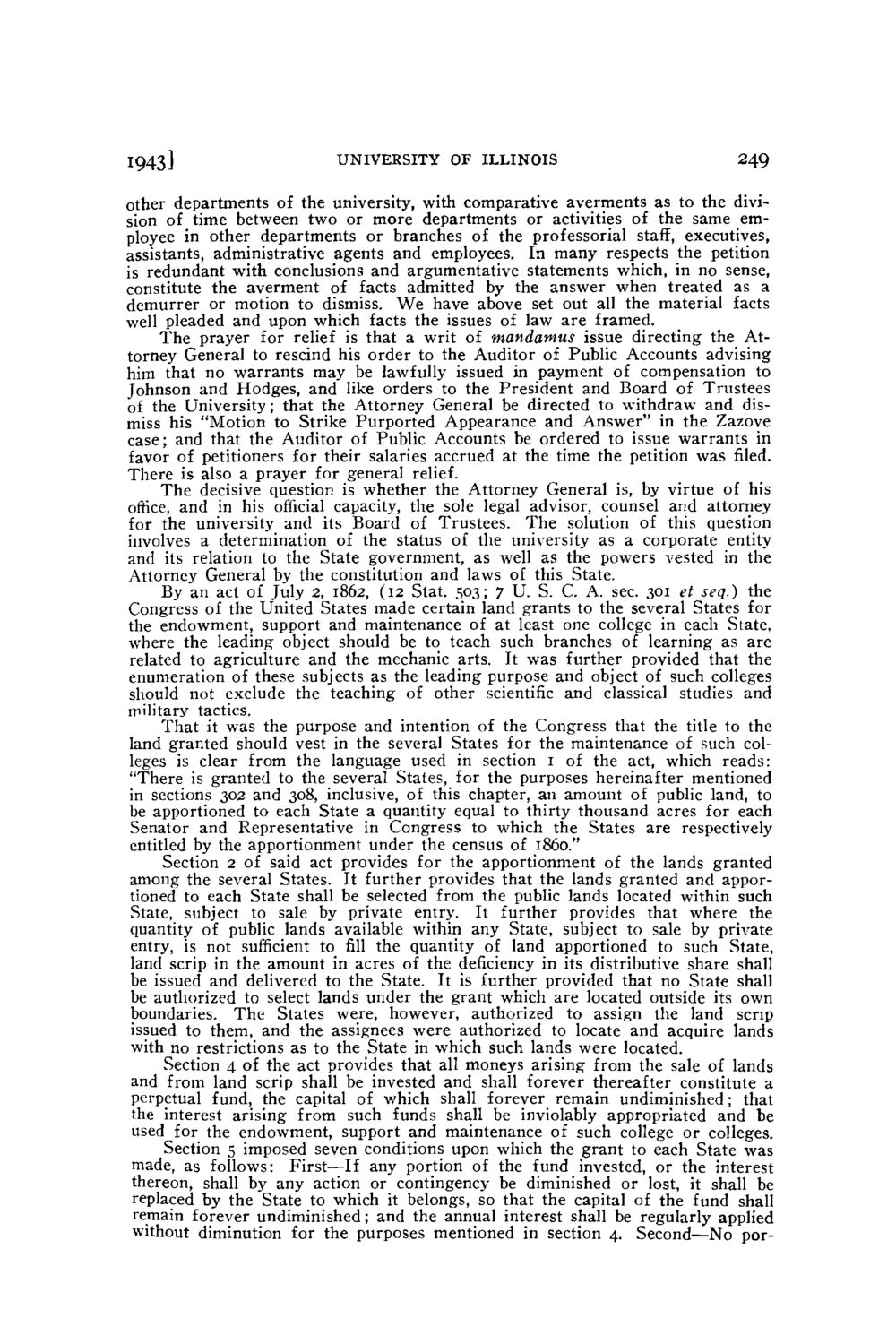| |
| |
Caption: Board of Trustees Minutes - 1944
This is a reduced-resolution page image for fast online browsing.

EXTRACTED TEXT FROM PAGE:
19431 UNIVERSITY OF ILLINOIS 249 other departments of the university, with comparative averments as to the division of time between two or more departments or activities of the same employee in other departments or branches of the professorial staff, executives, assistants, administrative agents and employees. In many respects the petition is redundant with conclusions and argumentative statements which, in no sense, constitute the averment of facts admitted by the answer when treated as a demurrer or motion to dismiss. W e have above set out all the material facts well pleaded and upon which facts the issues of law are framed. T h e prayer for relief is that a writ of mandamus issue directing the Attorney General to rescind his order to the Auditor of Public Accounts advising him that no warrants may be lawfully issued in payment of compensation to Johnson and Hodges, and like orders to the President and Board of Trustees of the University; that the Attorney General be directed to withdraw and dismiss his "Motion to Strike Purported Appearance and Answer" in the Zazove case; and that the Auditor of Public Accounts be ordered to issue warrants in favor of petitioners for their salaries accrued at the time the petition was filed. There is also a prayer for general relief. The decisive question is whether the Attorney General is, by virtue of his office, and in his official capacity, the sole legal advisor, counsel and attorney for the university and its Board of Trustees. T h e solution of this question involves a determination of the status of the university as a corporate entity and its relation to the State government, as well as the powers vested in the Attorney General by the constitution and laws of this State. By an act of July 2, 1862, (12 Stat. 503; 7 U. S. C. A. sec. 301 et seq.) the Congress of the United States made certain land grants to the several States for the endowment, support and maintenance of at least one college in each State, where the leading object should be to teach such branches of learning as are related to agriculture and the mechanic arts. It was further provided that the enumeration of these subjects as the leading purpose and object of such colleges should not exclude the teaching of other scientific and classical studies and military tactics. That it was the purpose and intention of the Congress that the title to the land granted should vest in the several States for the maintenance of such colleges is clear from the language used in section 1 of the act, which reads: "There is granted to the several States, for the purposes hereinafter mentioned in sections 302 and 308, inclusive, of this chapter, an amount of public land, to be apportioned to each State a quantity equal to thirty thousand acres for each Senator and Representative in Congress to which the States are respectively entitled by the apportionment under the census of i860." Section 2 of said act provides for the apportionment of the lands granted among the several States. It further provides that the lands granted and apportioned to each State shall be selected from the public lands located within such State, subject to sale by private entry. It further provides that where the quantity of public lands available within any State, subject to sale by private entry, is not sufficient to fill the quantity of land apportioned to such State, land scrip in the amount in acres of the deficiency in its distributive share shall be issued and delivered to the State. It is further provided that no State shall be authorized to select lands under the grant which are located outside its own boundaries. T h e States were, however, authorized to assign the land scrip issued to them, and the assignees were authorized to locate and acquire lands with no restrictions as to the State in which such lands were located. Section 4 of the act provides that all moneys arising from the sale of lands and from land scrip shall be invested and shall forever thereafter constitute a perpetual fund, the capital of which shall forever remain undiminished; that the interest arising from such funds shall be inviolably appropriated and be used for the endowment, support and maintenance of such college or colleges. Section 5 imposed seven conditions upon which the grant to each State was made, as follows: First—If any portion of the fund invested, or the interest thereon, shall by any action or contingency be diminished or lost, it shall be replaced by the State to which it belongs, so that the capital of the fund shall remain forever undiminished; and the annual interest shall be regularly applied without diminution for the purposes mentioned in section 4. Second—No por-
| |